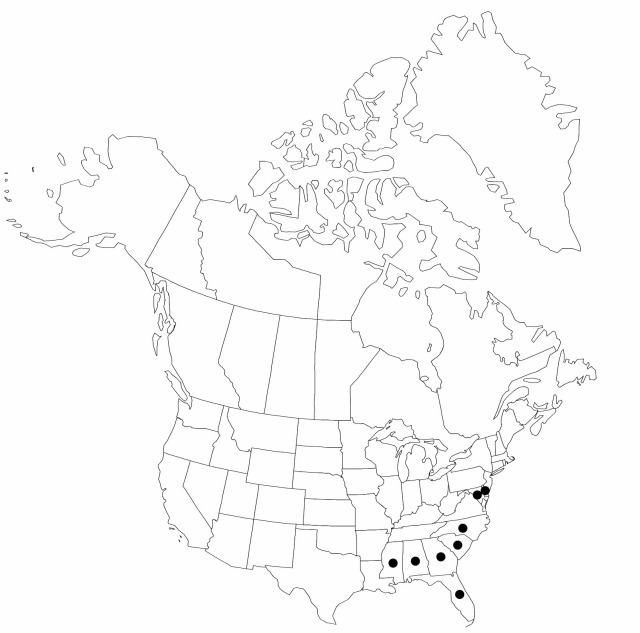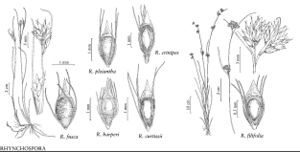Difference between revisions of "Rhynchospora harperi"
Man. S.E. Fl., 182, 1503. 1933.
FNA>Volume Importer |
imported>Volume Importer |
||
| (6 intermediate revisions by 2 users not shown) | |||
| Line 7: | Line 7: | ||
|year=1933 | |year=1933 | ||
}} | }} | ||
| − | |basionyms={{Treatment/ID/ | + | |special_status={{Treatment/ID/Special_status |
| + | |code=F | ||
| + | |label=Illustrated | ||
| + | }} | ||
| + | |basionyms={{Treatment/ID/Basionym | ||
|name=Rhynchospora leptorhyncha | |name=Rhynchospora leptorhyncha | ||
|authority=Small | |authority=Small | ||
| + | |rank=species | ||
| + | |publication_title= | ||
| + | |publication_place=1903 | ||
}} | }} | ||
|synonyms={{Treatment/ID/Synonym | |synonyms={{Treatment/ID/Synonym | ||
|name=Rhynchospora fascicularis var. harperi | |name=Rhynchospora fascicularis var. harperi | ||
|authority=(Small) Kükenthal | |authority=(Small) Kükenthal | ||
| + | |rank=variety | ||
}} | }} | ||
|hierarchy=Cyperaceae;Rhynchospora;Rhynchospora harperi | |hierarchy=Cyperaceae;Rhynchospora;Rhynchospora harperi | ||
| Line 29: | Line 37: | ||
|elevation=0–100 m | |elevation=0–100 m | ||
|distribution=Ala.;Del.;Fla.;Ga.;Md.;Miss.;N.C.;S.C.;Central America (Belize). | |distribution=Ala.;Del.;Fla.;Ga.;Md.;Miss.;N.C.;S.C.;Central America (Belize). | ||
| − | |discussion=<p>Rhynchospora harperi is most abundant in a very special habitat referred to here as the | + | |discussion=<p><i>Rhynchospora harperi</i> is most abundant in a very special habitat referred to here as the “<i>Hypericum</i> pond.” These are typically shallow ponds in pine savannas, frequently ringed by stands of <i>Nyssa</i>, <i>Taxodium</i>, Ilex, and <i>Cyrilla</i>, but most of the pond itself is dominated by one or more myriandrous shrubby <i>Hypericum</i> species. Here <i>R. harperi</i> is distinguished from other species by the often abrupt bend of its ultimate internode.</p> |
|tables= | |tables= | ||
|references= | |references= | ||
| Line 38: | Line 46: | ||
-->{{#Taxon: | -->{{#Taxon: | ||
name=Rhynchospora harperi | name=Rhynchospora harperi | ||
| − | |||
|authority=Small | |authority=Small | ||
|rank=species | |rank=species | ||
| Line 52: | Line 59: | ||
|publication title=Man. S.E. Fl., | |publication title=Man. S.E. Fl., | ||
|publication year=1933 | |publication year=1933 | ||
| − | |special status= | + | |special status=Illustrated |
| − | |source xml=https:// | + | |source xml=https://bitbucket.org/aafc-mbb/fna-data-curation/src/2e0870ddd59836b60bcf96646a41e87ea5a5943a/coarse_grained_fna_xml/V23/V23_413.xml |
|genus=Rhynchospora | |genus=Rhynchospora | ||
|species=Rhynchospora harperi | |species=Rhynchospora harperi | ||
Latest revision as of 21:40, 5 November 2020
Plants perennial, solitary or cespitose, 50–70 cm; rhizomes absent. Culms erect to excurved, leafybased, narrowly linear, ± terete. Leaves shorter than culm; blades ascending, narrowly linear, proximally flat or margins slightly involute, 0.5–1(–2) mm wide, distally canaliculate, apex trigonous, tapering, subulate. Inflorescences: spikelet clusters 1–3, laterals 0–2, all turbinate to hemispheric, terminal internode usually excurved; leafy bracts setaceous, overtopping inflorescence. Spikelets redbrown, lanceoloid, 5–7 mm, apex acute; fertile scales lanceolate, (2.5–)4–5 mm, apex acute to acuminate; midrib paralleled by several indistinct ribs, excurrent as short awns. Flowers: bristles 6, reaching from mid tubercle to beyond tip. Fruits 3(–4) per spikelet, 2.1–2.5 mm; stipe and receptacle 0.2–0.3 mm, sparsely setose and setulose; body glossy, brown with pale center, obovoid-lenticular, 1.1–1.5 × 1–1.1 mm, surfaces finely longitudinally lined, variably low papillatecancellate, also often transversely with wavy lines of dark dots; tubercle flattened, triangular-subulate, (0.8–)0.9–1(–1.1) mm, setulose-ciliate.
Phenology: Fruiting summer–fall.
Habitat: Sands and peats of bogs, stream banks, edges of pineland savanna ponds, Hypericum ponds
Elevation: 0–100 m
Distribution

Ala., Del., Fla., Ga., Md., Miss., N.C., S.C., Central America (Belize).
Discussion
Rhynchospora harperi is most abundant in a very special habitat referred to here as the “Hypericum pond.” These are typically shallow ponds in pine savannas, frequently ringed by stands of Nyssa, Taxodium, Ilex, and Cyrilla, but most of the pond itself is dominated by one or more myriandrous shrubby Hypericum species. Here R. harperi is distinguished from other species by the often abrupt bend of its ultimate internode.
Selected References
None.
